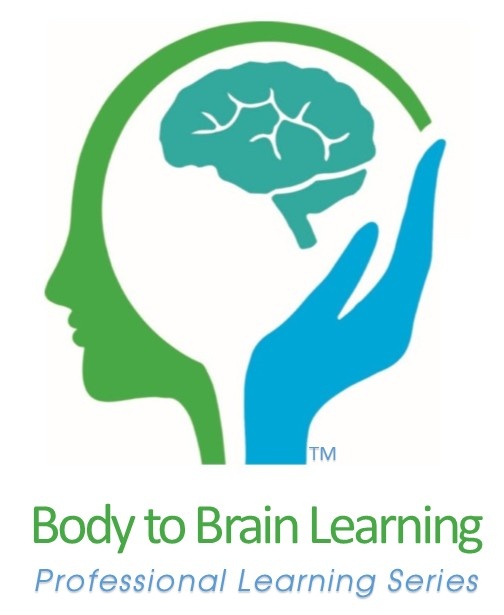Body to Brain Learning @ School
Using neurodevelopmental perspectives to create readiness, enhance potential & increase engagement for learning.
"Body to Brain Learning @ School" helps teachers identify, assess and address underlying neuromotor and sensory issues that may be making the school learning experience harder than it needs to be (for everyone).
Designed to help educators understand, implement and make changes that are effective and sustainable, based on inclusive education principles and delivering the Australian Curriculum. It's not an add-on! We teach, mentor and coach educational staff to use neurodevelopmental principles that make the teaching difference and that makes a difference in the lives of students.
It's about KNOWING STUDENTS and HOW THEY LEARN
and using the body to help the brain learn more effectively.
Registration details and optionsLearning difficulties challenge more than just the student; they also challenge the teachers who accommodate their learning needs.
"Body to Brain Learning @ School" helps teachers know their students & how they learn.
- It helps educators understand & use the neurodevelopmental aspects of learning that shape & support student learning.
- It enhances student learning and wellbeing in school, at any year level.
- It's more than a programme in your school, it's a way of working and thinking.
Dr Christine Payard (PhD) Neurodevelopmental Educator & Founder of 'Body to Brain LearningTM''
"Body to Brain Learning @ School" is a professional learning opportunity for educators helping them identify, assess and address neurodevelopmentally based learning challenges.
"We use our body to learn with our brain."
Dr Arthur Paynter (Consultant Paediatrician)

"Body to Brain Learning @ School" explains how neurodevelopmental movement, sensory development, experience and opportunity in the early years prepare a child's brain for later academic learning success.
More than that, ...
It helps educators learn how to use that information to enhance the learning and wellbeing of students (no matter what age or year level) which, in turn, enhances the teacher's sense of wellbeing and teaching success.
"Body to Brain Learning @ School" helps teachers crack the code of HOW students learn.
Educators: 'Body to Brain Learning @ School' guides & upskills your teaching approach & effectiveness.
It explores the neurodevelopmental foundations of learning and increases your understanding of how these foundations support academic learning success.
We help you:
- Assess & address neuromotor readiness for learning using evidence-based screening assessments & structured activities
- Streamline your information gathering processes, collecting important learning data about your students and HOW they learn
- Address the neurodevelopmental based challenges you identify
- Enhance the learning success and wellbeing of students in your class/school using targeted, simple, daily movement activities.
Basically, "Body to Brain Learning @ School" helps you do your job more efficiently and effectively. That feels less overwhelming, more manageable and like you are making a real difference for your students.
"Body to Brain Learning @ School" is practical neurodevelopmental science with activities that foster better learning and wellbeing for our students.
It's "knowing your students and HOW they learn." (AITSL 1.2)
This approach improves student learning outcomes:
-
academically
-
physically, and
-
emotionally.
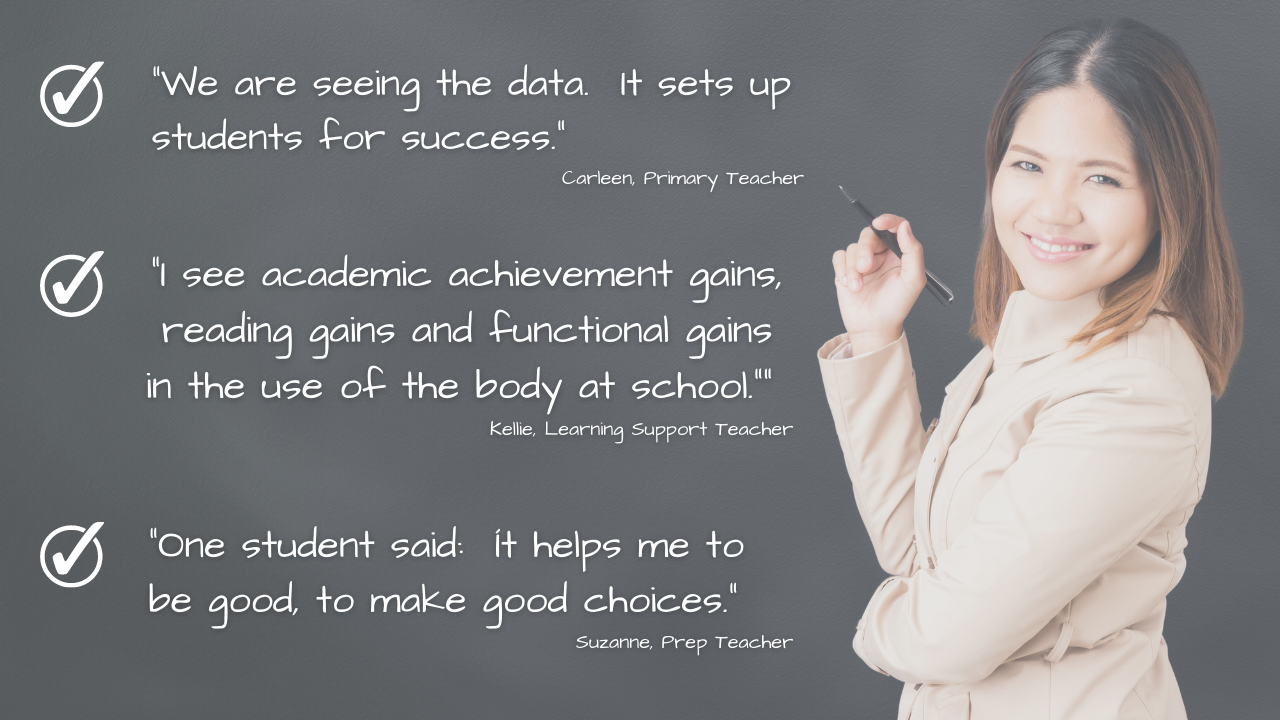

We know teaching life is hectic and can be overwhelming.
This approach relieves some of that pressure.
"I always knew this approach and early movement was important. Now I understand why and I can use that information to understand and help my students more quickly."
Suzanne H. (Pre-school teacher),
Who is 'Body to Brain Learning @ School' for?
- Classroom teachers
- Educational leaders
- Learning Support and Diversity teachers,
- Wellbeing personnel and,
- Those working with and supporting student learning in school.
Dr Christine Payard (PhD) explains a bit more about "Body to Brain Learning @ School." Why we need to know about neurodevelopment to enhance & support learning and wellbeing. Why this is especially helpful for those students with learning challenges.
Our goal:
We want educators to be confident in using movement-based neurodevelopmental knowledge to improve the learning potential and wellbeing of students in their classrooms.
Educators, we want to:
- enhance your teaching experience and professional wellbeing by helping you read the body language of behaviour & learning,
- help you use an approach that supports learning success and,
- help you meet administrative & reporting requirements for the learning adjustments you make in your classroom.
We know teaching life is hectic and can be overwhelming. This approach relieves some of that pressure while enhancing student learning and potential.
"Body to Brain Learning @ School" helps educators identify, assess and address the physiological foundations that underpin learning success. If a student's body doesn't support their learning at school, it can interfere with their learning at school. We help educators address that challenge.
Six Things 'Body to Brain Learning @ School' Delivers:
1. Professional Learning that builds a community of educators who know learning is more than a brain-based activity and that learning can be different for each student. We can help teachers meet each student where they are at.
More detail:
1. This approach is holistic. It recognises learning is more than a thinking activity. It helps teachers identify and meet the needs of individual students at a foundational learning level where the body helps the student learn. It helps them describe how a child learns instead of labelling them.
We know if the body isn't developmentally ready and mature to support students in learning activities, we will often see that immaturity expressed through behavioural issues, a lack of engagement and an inability to succeed and achieve at curriculum standard.
A student's body language tells us there are learning challenges.
This course helps educators identify and address those challenges using a neurodevelopmental, neurophysiological approach.
We help participants gather individual student-based data to support their teaching decisions, enhance learning opportunities, and help their students learn more effectively. "Body to Brain Learning @ School" helps meet the learning needs of a diverse cohort of students.
"Body to Brain Learning @ School" supports student learning, contributes to the wellbeing of students and teachers, and it works!
2. An Internationally recognised & evidence-based approach contextualised for the Australian school context.
More detail:
2. "Body to Brain Learning @ School" is based on the INPP Schools Programme published in the book "Assessing Neuromotor Readiness for Learning" by Sally Goddard Blythe. This approach has been shown internationally to improve neuromotor performance in school children. Dr Christine Payard (PhD) helps participants make connections with the Australian Curriculum, showing them that using this approach is teaching the Curriculum, not adding to it.
We incorporate Universal Design for Learning (UDL) principles ensuring all students are included in an approach designed to support better learning, function and well being in school.
We help teachers become more confident in meeting their reporting and administrative requirements by identifying and articulating the inclusive education approaches implicit in this approach.
We refer to publications and a growing body of research that links neurodevelopmental movement to learning and functional success.
3. Support for students with body-based learning challenges. It builds teachers' conceptual understanding and applies it in practice. It's more than strategies, quick fixes and "tricks of the trade". It's a system, a way of working that improves student learning and contributes to student and teacher wellbeing in school.
More detail:
3. "Body to Brain Learning @ School" provides conceptual understanding and an approach that informs teachers' decision making and practice. It incorporates a neurodevelopmental and functionally based paradigm for learning and teaching that acknowledges "we use our body to learn with our brain." So it's more than saying: "Some children have learning difficulties, here's, a strategy", and "This is a discipline or 'behavioural management' issue."
It's more than identifying, using and applying labels to student behaviour and performance. It's helping teachers identify, assess and support how a student uses their body to learn.
We give you a recommended structure and approach, then work with you to help make it real in your school. We know if you understand the concepts of neurodevelopmental maturity, you can problem solve and apply them in practice.
We teach, mentor, and coach you to deliver a neurodevelopmental approach to support classroom learning and wellbeing. Body to Brain Learning @ School is not a one-hit wonder or one-day "flash in the pan" PD event. It's a learning opportunity based on current theory and research in professional learning in education. It supports teachers in learning, applying, customising, and meeting the needs of students over time so that educational change is sustainable and ongoing. We mentor and coach teachers in the process of applying the knowledge and approach in a variety of educational settings.
4. Tuition, coaching & mentoring in group & one-to-one settings with experienced practitioners and educators
More details:
4. The three-part course includes individualised self-paced tutorials, group work, and ongoing mentoring opportunities to support learning and implementation in your school environment. It includes online learning with Dr Christine Payard (PhD) and face to face workshops with post-graduate level trained practitioners who mentor and coach you/your team.
5. The opportunity to learn from people who have done the complex & hard study for you.
More details:
5. "Body to Brain Learning @ School" is led and facilitated by Neurodevelopmental Educator, Consultant and Trainer Dr Christine Payard (PhD) and a network of licensed neurodevelopmentally trained practitioners.
Dr Christine Payard (PhD) is an Australian Neurodevelopmental Therapy Trainer and Leader with extensive experience in education and allied health. She has been working and studying in this specialised field for over ten years.
Your regional "Body to Brain Learning @ School" mentor/coach has completed postgraduate level training and comes with rich background experience and practice working with children and adults, helping them to improve their learning and function.
"Body to Brain Learning @ School" instructors, mentors and coaches are INPP trained practitioners who use neurodevelopmental intervention and therapeutic processes that have been used internationally for over 40 years. They are passionate about helping children learn and function well and have committed to ongoing professional development in this field.
6. Professional Learning aligned to and addressing AITSL standards.
Twelve (12) hours of contact time focussing on and addressing AITSL Standards: 1.1, 1.2, 1.5, 1.6 and others...
A certificate of completion can be issued to those who complete the "Body to Brain Learning @ School" Professional Development opportunity.
Obviously, there are more than 6 benefits
to this approach & professional learning opportunity.
HERE ARE SOME RESULTS TEACHERS HAVE IDENTIFIED:
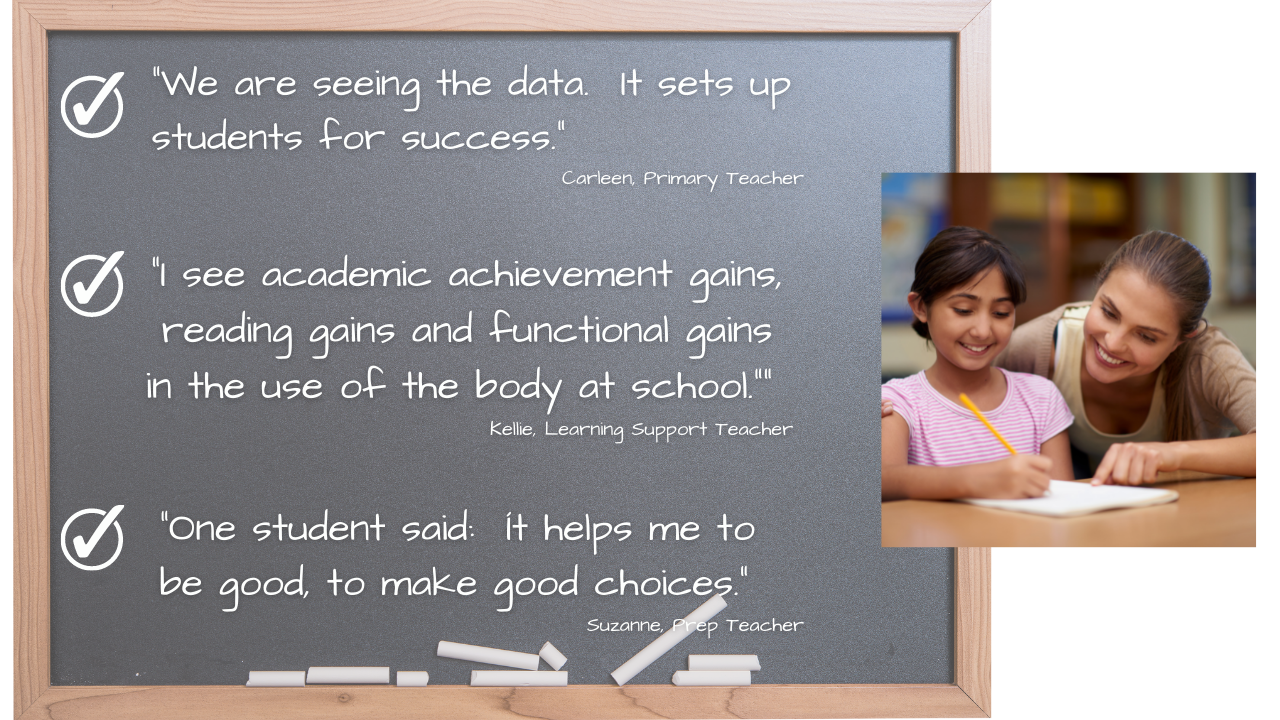
Suzanne:
(Prep Teacher, Bundaberg. 2020)
"It has freed our teachers to teach."
"I didn't realise how much balance had to do with the whole cognitive and social wellbeing of students."
"One student said: 'It helps me to be good, to make good choices.' "
Carleen:
(Primary Teacher, Tyers. 2020)
"I feel like I've got the key to Aladdin's cave. It has changed my teaching forever. It has changed my world as a teacher. I feel that I am more well balanced as a teacher."
"It has changed our school. People are asking what we've changed. It's this."
"We are seeing the data. It sets up students for success."
Kellie:
(Learning Support Teacher, Sydney. 2021)
On what triggered her professional learning journey:
"I just wanted to know why the kids sitting next to me, despite the evidence-based Literacy Intervention I was doing, why some kids shifted and why some kids didn't. I knew a little bit about neuro-plasticity and I just wanted to understand the brain a bit more and understand what was really going on under the surface and that's how I got into it."
Results:
"Academic achievement gains, reading gains and functional gains in the use of the body at school. Some, you know, I can just sort of tell that there's something going on to do with the primitive reflexes or vestibular dysfunction. It's pretty much become my role."
A PRINCIPAL'S PERSPECTIVE:
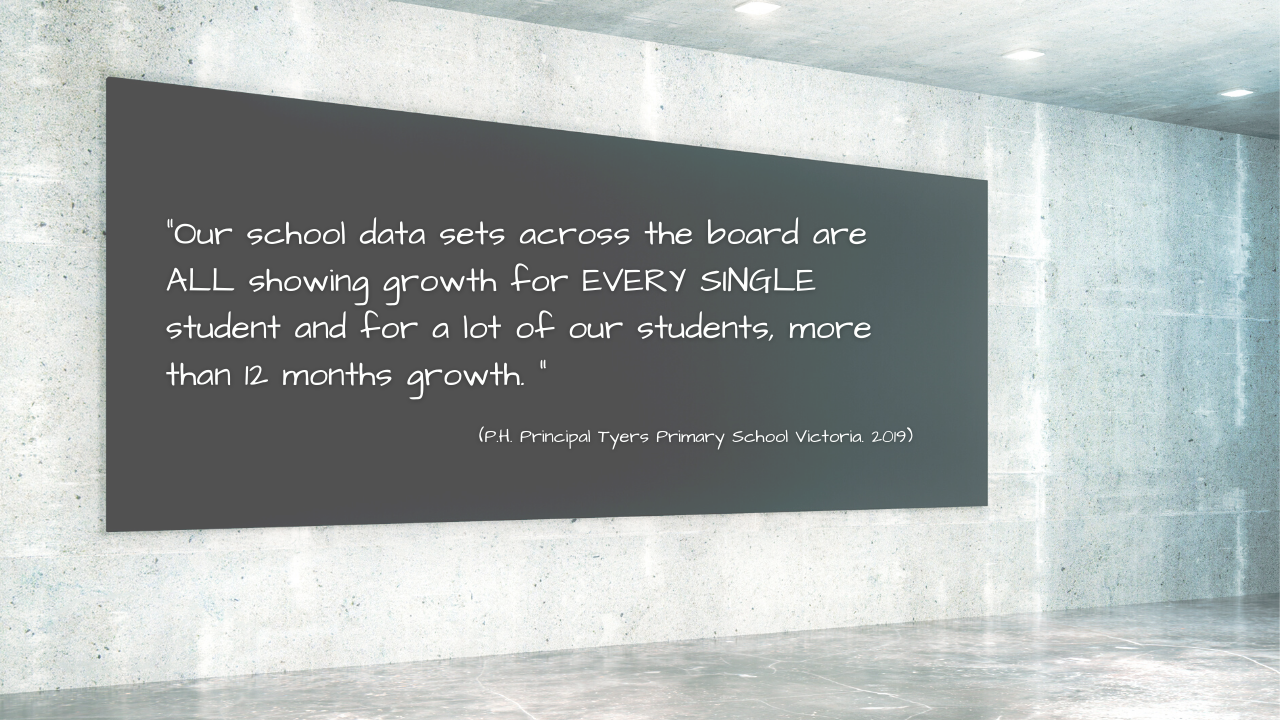
Supporting the whole child.
"For us, it's about making sure we have a complete package that supports every kid's individual needs and that it's not just the curriculum that is differentiated for their needs, but it's differentiated for their whole needs, not just curriculum. Everything: it's social wellbeing, their home life, everything they bring."
(P.H. Principal Tyers Primary School, Victoria. 2019)
Student Learning Outcomes.
"Our school data sets across the board, that includes NAPLAN teacher judgements, all of our PAT Maths, PAT REading, PAT GRammar, PAT Spelling, our SMG's, our benchmarking, our running records, are all showing growth for every single student and for a lot of our students, more than 12 months growth. So we are very pleased with how this is impacting in our school."
(P.H. Principal Tyers Primary School Victoria. 2019)
Financial investment.
"This [approach] saves the school money and time not spent on other tasks:
- behaviour management,
- on time off-task,
- on the time & paperwork for exclusion -- we DON'T have them.
- in settling kids and getting them ready for learning,
We're creating a supportive learning culture focused on the whole child. We are more able to meet students' learning needs and engage them for better learning."
(P.H. Principal. Tyers Primary School, Victoria. 2019)
THE COURSE OUTLINE:
"Body to Brain Learning @ School" provides 12 hours of direct CPD, and 6+ hours of mentoring and coaching in practice, in three parts. Part 1 is online and delivered by Dr Christine Payard (PhD). Parts 2 is face to face in a workshop setting, and Part 3 involves negotiated delivery of mentoring processes with a locally-based or regional, licensed Neurodevelopmental Body to Brain Learning Facilitator.
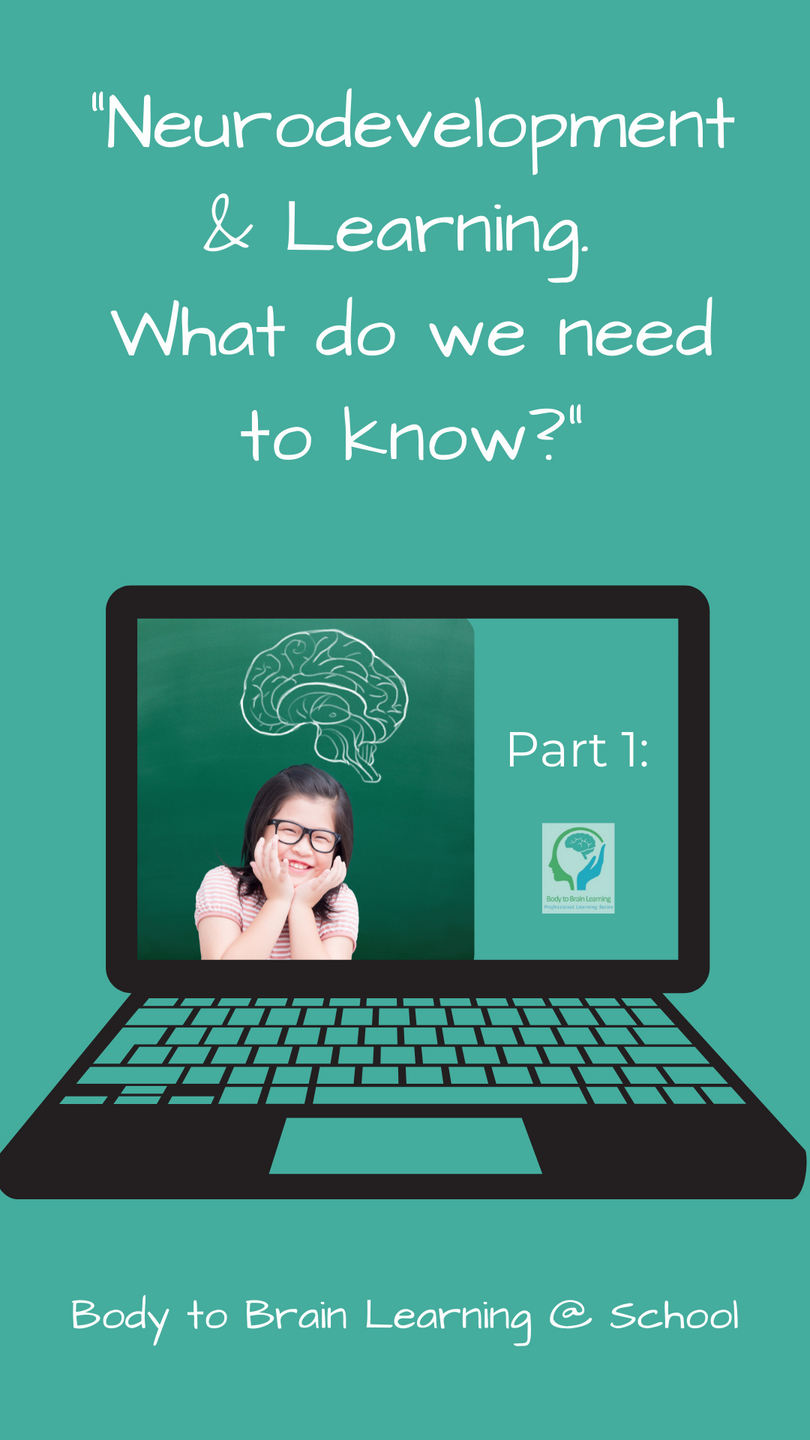
PART 1: Neurodevelopment & Learning. What do we need to know?
Part 1 is delivered online through an individually accessed, private learning portal. It's six (6) hours of learning. It's self-paced and includes Q & A support sessions with Dr Christine Payard (PhD) offered as a bonus through the course.
Delivered by Dr Christine Payard (PhD), Part 1 presents the theory, concepts and model of neurodevelopmental learning that underpins the "Body to Brain Learning @ School" approach.
Topics include:
- Neurobiology of learning
- Neurodevelopment and the contribution of sensory systems for supporting academic learning
- Reading the body language of learners to see how their body supports (or interferes) with their learning
- Key primitive reflexes that should be integrated and mature for a child to reach their learning potential. Hint: If they aren't mature, the child may have neuromotor immaturity (NMI), making learning challenging
- Learning challenges common to NMI and other neurodiverse presentations.
- Making connections with the Australian Curriculum (including the General Capabilities) and reporting for NCCD
- International research relating to this method in schools
Q & A Sessions with Dr Christine Payard (PhD) are part of this programme.
PART 2: Assessing & Addressing Neuromotor Readiness for Learning
Delivered by trained Neurodevelopmental Practitioners who have completed additional and specialised study in neurodevelopment and learning. Part 2 is a 1-day (6 hours) face to face interactive training session for staff (teachers and teacher aides) who are implementing the approach at school.
It can be delivered to school groups, or as workshops for individuals to attend
Part 2 focuses on:
(a) the assessment of students' neuro-motor readiness for learning using a battery of standardised screening tests to obtain a database and profile of each student, and,
(b) development and delivery of the movement activities and programme in school settings.
Part 2 is interactive, involves participants using assessment strategies, collecting data, interpreting the results and practising the movements in the Schools Programme.
The trained Body to Brain Learning @ School Facilitator is available to mentor you and your team in an ongoing process. Their goal is to facilitate the implementation of the approach and help embed it in your school setting (Part 3).
PART 3: Mentoring and Coaching
We suggest a minimum of 6 hours mentoring and coaching using the “Body to Brain Learning @ School” approach in your context. This helps embed the approach in your practice at school with the assistance of a skilled neurodevelopmental practitioner.
Mentoring and coaching will:
- facilitate the application of the screening and assessment protocols in your school with participants and students,
- provide ongoing support in the delivery of the movement activities throughout the academic year and troubleshoot issues for you,
- provide follow up/support in data collection and interpretation for reporting on the success of the programme.
Part 3 can include online meetings, school visits, telephone support, zoom conferences and other methods of coaching and mentoring. The extent and nature of Part 3 support are negotiated with each participant or school and will vary according to the context in which the participant works.
Base coaching and mentoring packages begin with 6 hours of coaching and mentoring support.
Additional hours and support can be negotiated with each mentoring practitioner.
Click here for more frequently asked questions!
"Body to Brain Learning TM @ School" focuses on addressing AITSL Standards: 1.1, 1.2, 1.5 & 1.6; but it also incorporates AITSL Standards 2.3; 3.2; 6.2, 6.3, 6.4 & 7.2
Presenters:
Dr Christine Payard (PhD):
[B. Ed (Hons); M Ed Studies (Language & Literacy), PhD, GAICD, INPP (NDT) and others.]
Director and Founder of Integrating Thinking, the Body to Brain Learning Professional Development Series, and recent Principal of INPP Australia.
Neurodevelopmental Educator, teacher, mentor, advisor, speaker and author.
Christine’s professional experience is broad. It includes over 30 years in Education, over 20 years in the world of optics and optometry practice management, and over 10 years in the field of Neurodevelopmental Education, training and consultancy. She loves to teach, mentor and support those who help others learn with the goal of improving learning.
Christine’s lifelong interest and passion, learning about learning and how we learn, has led her to pursue professional studies and research in a variety of areas including investigating students thinking processes in response to teacher questions, literacy and numeracy learning & teaching, teacher’s professional learning, and, the neurophysiological aspects of learning that impact educational success and performance.

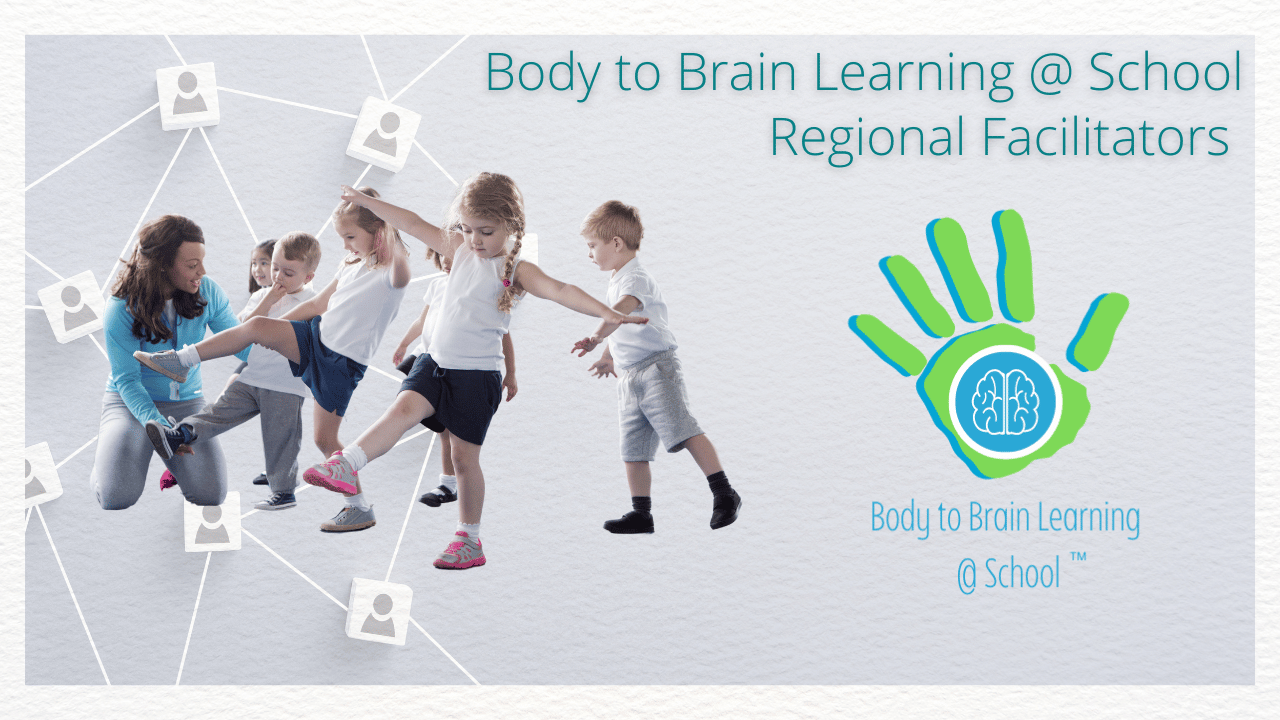
Your trained course mentor & coach.
Practitioners who deliver "Body to Brain Learning @ School" are trained Neuordevelopmental Practitioners who have completed post-graduate level study and additional training in clinical methods working with individuals and schools. They are practitioners committed to ongoing study in this field of work and are part of Australian and International networks of neurodevelopmental practitioners.
Your mentor and coach has studied and worked closely with Dr Christine Payard (PhD), including undertaking additional professional learning in the facilitation of "Body to Brain Learning @ School" to use this approach in Australian School contexts. They are regionally based and able to negotiate delivery with you to suit your school, school district or individual educator's requirements in workshop delivery modes. They continue to work closely with Dr Christine Payard (PhD) and national colleagues in the delivery of this approach.
What others have said about this course:

"The best PD I've ever done."
"Such an important consideration for helping our students learn."
"Once you see it and understand it, you can't unsee it. It makes so much sense!"
"This was describing most of the children in my class who were struggling to learn."
"I am now able to identify students learning needs so much more quickly and help them learn more effectively. "
[Anonymous written feedback from teachers.]
What others have said about Dr Christine Payard (PhD) & her courses:

"Chris is an excellent presenter, armed with extensive knowledge, practical experience, empathy, wisdom and an ability to explain complex concepts in an easy-to-understand way. Her courses are highly recommended."
Carmin H


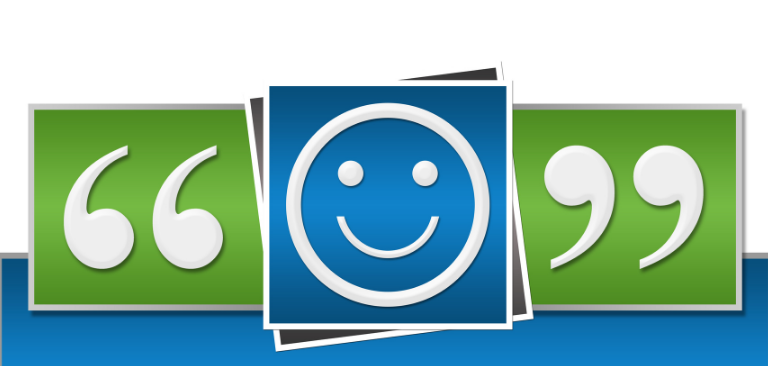
"I highly recommend Chris's teaching approach. The lovely atmosphere she has provided with her colourful presentations. We, as participants, cherish each others friendship, professional support hopefully for the rest of our life."
N.K.
“I’m so excited! I have really enjoyed the course with you. Thank you for your knowledge, your kind attitude and flexibility. So happy to be joining your network!” (O.B.)
COURSE OPTIONS & PRICING:

2026 courses in Australia.
- "Body to Brain Learning @ School Regional Facilitators" are located in various places across Australia.
- Interstate "Body to Brain Learning @ School" by Christine Payard (PhD) can be arranged on request, although Licensed "Body to Brain Learning @ School™ Regional Facilitators" will be recommended if they are in your area.
- Special delivery options for Student Free Days and full staff workshops can be arranged. (See information below these course delivery details.)
Mixed-mode delivery of "Body to Brain Learning @ School"
Part 1: online; Part 2: face-to-face; Part 3: to be negotiated as required.
Part 1: Body to Brain Learning @ School -- theory
$397
Price per participant.
REGISTER NOW for PART 1 ONLINEPart 2: Practical application
Face-to-face delivery
Price per participant or per school
Part 3: Coaching & mentoring
Negotiated with mentor
Price per participant or per school
School based delivery
Learning difficulties challenge more than just the student, they also challenge the teachers who accommodate their learning needs.
The "Body to Brain Learning @ School" approach helps teachers identify, assess and address underlying neuromotor and sensory issues that are likely to be making the school learning experience harder than it needs to be (for everyone).
If we help support and enhance the ways our students learn, we will see:
- improvement in the achievement of learning outcomes
- students who are calmer, more engaged and ready for learning
- enhanced teacher, staff and student well-being
- Learning happening more effectively.
If you would like to:
- create a complete school-based approach to help children with learning challenges or just aren't reaching their learning potential
- help teachers identify and address underpinning neurodevelopmental issues that may be holding back the learning of their students,
- support the well-being of your staff and students by empowering educators to see, understand and respond to HOW their students are using their body to learn,
THEN, consider "Body to Brain Learning @ School" as a school based professional learning opportunity.
It's NOT just a one off, one hit wonder school PD session. It's designed to become a part of how teachers work.
"Body to brain Learning @ School" supports educators to understand, implement and make changes that are effective and sustainable. It's about helping students access the Australian Curriculum and it is based on inclusive education principles.
We will teach, mentor and coach staff to make the difference in pedagogical approaches and make a difference in the lives of their students (after all, isn't that why we teach?)
Contact us to arrange school based delivery as part of a whole school approach.
Email: [email protected]
Frequently Asked Questions:
Does this help me meet the needs of my neurodiverse students?
Why should I, or my teachers, do this course?
Is this an evidence based programme?
Is this neurodevelopmental movement approach just about getting students to exercise and move?
"Neurodevelopment and Learning" sounds really nerdy and heavy. What if I'm not confident about my ability to learn this stuff? Will it be really academic?
Do we need to purchase any text books for this course?
I'm really just looking for some quick strategies to help my students with learning difficulties. Does this course give me that?
Can I do this course individually or does it have to be run through my school?
How much time do we need to set aside to study?
Can I start PART 1 whenever I want?
What if I want to learn more about this way of working with students?
Do I receive a certificate of completion for this course?
What if I have other questions?
Arrange a direct delivery option for your school...
Email: [email protected]
Join us in this initiative!

Brought to you by:
